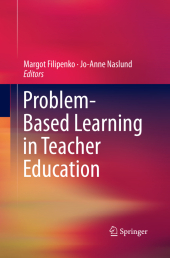 Neuerscheinungen 2019Stand: 2020-02-01 |
Schnellsuche
ISBN/Stichwort/Autor
|
Herderstraße 10
10625 Berlin
Tel.: 030 315 714 16
Fax 030 315 714 14
info@buchspektrum.de |

Margot Filipenko, Jo-Anne Naslund
(Beteiligte)
Problem-Based Learning in Teacher Education
Herausgegeben von Filipenko, Margot; Naslund, Jo-Anne
Softcover reprint of the original 1st ed. 2016. 2019. xii, 241 S. 4 SW-Abb. 235 mm
Verlag/Jahr: SPRINGER, BERLIN; SPRINGER INTERNATIONAL PUBLISHING 2019
ISBN: 3-319-79131-1 (3319791311)
Neue ISBN: 978-3-319-79131-9 (9783319791319)
Preis und Lieferzeit: Bitte klicken
This book provides examples that clarify the theoretical and design features that underlie problem-based learning in elementary teacher education. It outlines the roles of all stakeholders, including education librarians and subject area resource instructors.
This book offers readers a comprehensive understanding of problem-based learning (PBL) in teacher education. Featuring the perspectives of experienced teacher educators, it details the strengths of problem-based learning pedagogy as well as identifies continuing challenges and future possibilities.
The book explains the goals, content, processes and strategies of a successful and longstanding problem-based learning teacher education program at the University of British Columbia. It features contributions from tutors, faculty, school administrators, faculty advisors, school advisors, librarians and pre-service teachers who share their perspectives about problem-based learning as a robust and exciting approach for teaching and learning.
Overall, the contributors to the book discuss the history of the program, its implementation and future directions. In the process, readers discover the ways that problem-based learning has succeeded in preparing educators to teach diverse learners and acquire the professional dispositions necessary for teaching in today´s multilingual/multicultural classrooms.
FOREWORD, Anna Kindler and Pawel Kindler.- Discovering, uncovering and creating meanings: Problem-based learning in Teacher Education, Margot Filipenko, Jo-Anne Naslund and Linda Siegel.- SECTION 1: DISPOSITIONS FOR INQUIRY .- Exploring theoretical frameworks of problem-based learning through Aoki´s Curriculum-as plan and Curriculum-as-lived, Jeannie Kerr.- Dispositions for Inquiry, Jo-Anne Naslund and Lori Prodan.- SECTION 2: COLLABORATION: WORKING TOGETHER.- Knowledge Mobilization and Innovation in the Development of a PBL Cohort for Teaching English Language Learners: Successes, Challenges and Possibilities, Margaret Early and Steven Talmy.- Negotiating the content of problems in TELL/PBL, Margot Filipenko.- Finding good governance: Collaboration between the University of British Columbia and the Richmond School District, Kathyrn D´Angelo, Gail Krivel-Zacks and Catherine Johnson.- Collaboration: The heart of the school-based practicum, Carolyn Russo and Nicky Freeman.- SECTION 3: FOSTERING ACTIVE LEARNING.- The Multiple Roles of the Tutor in a Problem-based Learning Cohort in a Teacher Education Program, Frank Baumann and Monica Tarampi.- "I´m not allowed to tell you:" What does it mean to be a Problem-based Learning Tutor? Lori Prodan.- Investigating Cases: Problem-based Learning and the Library, Jo-Anne Naslund.- Integrating Social and Ecological Justice: A Programmatic Strand, Anne Zavalkoff.- The Place of Problems in Problem-based Learning: A Case of Mathematics and Teacher Education, Cynthia Nicol and Fil Krykorka.- Measures of Success: Presentations, Packages and the Triple Jump, Anne Zavalkoff/- SECTION 4: REFLECTIONS.- Challenges Issues as the Teaching English Language Learners through Problem-based Learning (TELL through PBL) moves forward, Margot Filipenko, Jo-Anne Naslund and Lori Prodan.- AFTERWORD, Wendy Carr.- Contributors.- Index.


